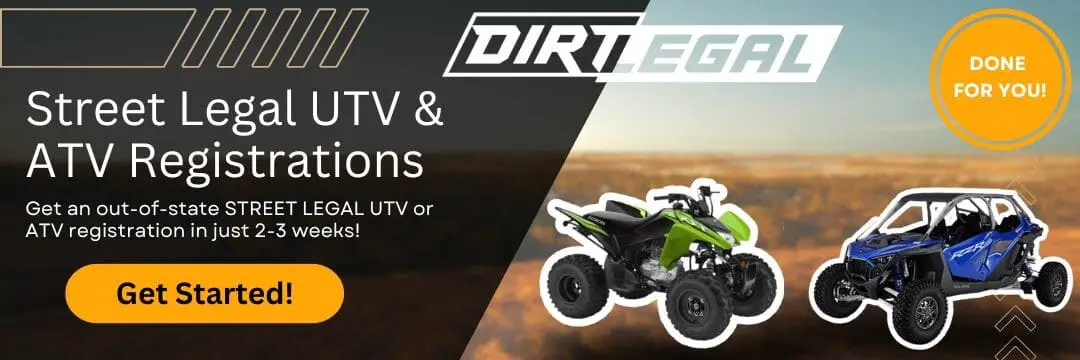Table of Contents
In this article, we will answer some common questions about the law on street-legal use of ATV and UTV in the state of Kansas based on the Kansas Statutes. If you own an all-terrain vehicle (ATV) or a utility vehicle (UTV) in Kansas, you may be wondering if you can legally drive it on public roads. The answer is not so simple, as different laws and regulations apply depending on where, when, and how you operate your ATV or UTV.
1. Can I register my ATV or UTV as street-legal in Kansas?
No, you cannot register your ATV or UTV as street-legal in Kansas. This means you cannot operate your ATV or UTV on Kansas roads and highways.
According to the Kansas Statutes, an ATV is defined as “any motorized nonhighway vehicle 55 inches or less in width measured from the outside of one tire rim to the outside of the other tire rim, having a dry weight of 1,500 pounds or less, traveling on three or more nonhighway tires.” A UTV is not explicitly defined in the statutes, but it is generally considered as a type of ATV that has four or more wheels and a side-by-side seating arrangement. ATVs and UTVs are permitted for use as offroad vehicles in Kansas and may be used in designated off-road areas.
2. Why does Kansas not allow ATVs or UTVs to register as street-legal?
The main reason why the state of Kansas does not allow ATVs or UTVs to register as street-legal is because they are not designed for highway use. ATVs and UTVs are intended for off-road use on trails, fields, farms, and other unpaved surfaces. They do not have the same safety features, equipment and standards as regular vehicles that are meant for highway use.
3. Where can I legally ride my ATV or UTV in Kansas?
You can legally ride your ATV or UTV on private property with the permission of the owner. You can also ride your ATV or UTV on public streets of second or third class cities (cities that have under 15,000 residents), and county and township roads, during daylight hours and, if equipped with lights, during evening hours. However, you must obey all traffic laws and regulations while doing so.
You cannot ride your ATV or UTV on any federal or state road in Kansas unless you meet one of the following exceptions:
- You are operating an ATV or UTV owned and operated by a County Noxious Weed Department, or by persons contracting with a County Noxious Weed Department, or the Kansas Department of Transportation for the purpose of eradicating noxious weeds.
- You are crossing a federal or state road at an angle of approximately 90 degrees at a place where no obstruction prevents a quick and safe crossing.
- You are engaged in agricultural purposes and you meet certain conditions such as having a valid driver’s license, having liability insurance coverage, having lights and reflectors on your ATV or UTV, wearing a helmet if under 18 years old, etc.
You can also ride your ATV or UTV on designated trails in some state parks or lands in Kansas. However, you must obtain a permit from the Kansas Department of Wildlife, Parks and Tourism before doing so. You can find more information about the permit requirements and fees here.
4. If I register my ATV or UTV in another state, can I drive it on Kansas roads? (Registration Reciprocity)
If you register your ATV or UTV in another state that allows street-legal use of ATVs or UTVs, you may be able to drive it on Kansas roads under certain circumstances. However, you must comply with the laws and regulations of both the state where you registered your ATV or UTV and the state of Kansas.
The state of Kansas does not have a formal registration reciprocity agreement with any other state for ATVs or UTVs. However, the Kansas statutes state that “the provisions of this section shall not apply to any person who is a resident of another state and who is operating an all-terrain vehicle in this state if such person is in compliance with the laws of such person’s state of residence.” This means that if you are a resident of another state and you are operating an ATV or UTV that is registered and street-legal in your state of residence, you may be exempt from the Kansas registration and titling requirements.
Remember, each state has its own specific laws and regulations regarding the registration and operation of ATVs and UTVs. Therefore, even if your vehicle is registered as street-legal in another state, it does not exempt you from Kansas’s laws and restrictions. Always check with your local motor vehicle licensing office for accurate information on the regulations relating to the use of ATVs and UTVS in public roads under their jurisdiction. Click here to view ATV & UTV laws in other states.
5. How can I make my ATV (or UTV) street legal in Kansas?
Generally speaking, you cannot make your ATV or UTV street legal in Kansas as the state’s legal code does not allow for this, but generally, if your vehicle is properly registered in another state, it may still be operated in another state, and in this case, the state of Kansas as it honors Registration Reciprocity.
However, if you would like the opportunity to be able to register your ATV or UTV as street-legal and ride it on public roads and highways in states that will allow it, we have partnered with Dirtlegal.com. These guys can help get your ATV or UTV to register as street-legal in most states by registering it in another state that does allow street legal UTVs and ATVs, via “registration reciprocity” between the states.
Get STREET LEGAL with DirtLegal.com
Conclusion:
In Kansas, ATVs and UTVs are not eligible for street-legal registration and, generally, operating them on public roads is prohibited. While this regulation may vary per jurisdiction, ATVs or UTVs may still be operated in a number of trails in the state of Kansas.
While this article has provided a comprehensive overview of the street-legal laws on ATVs and UTVs in this state, it is important that you consult your local motor vehicle licensing office for more specific and accurate information regarding ATV and UTV regulations. Because state laws can change over time and regulations differ between jurisdictions, the information presented here may not provide the most up-to-date or region-specific details.
Remember that street legality is determined by state and local laws, and it is your responsibility as an ATV or UTV owner to ensure that you are operating your vehicle within the legal boundaries while also getting the most fun out of it.
Helpful Resources:
- DirtLegal.com: Register your vehicle as “street legal” (done for you!)


